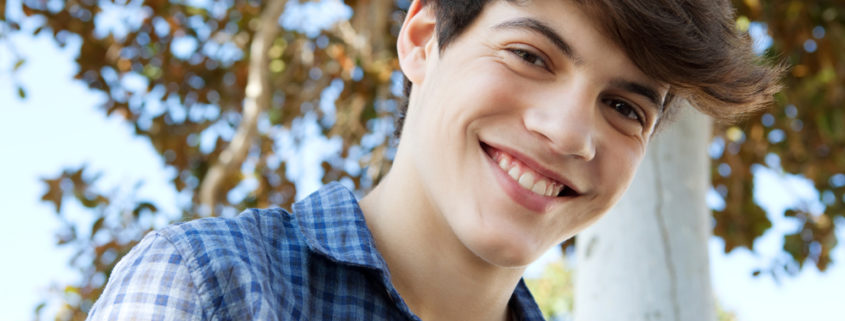Sleep Apnea in Teens: What It Is, Effects & Treatments
Teens need their beauty sleep. According to the National Sleep Foundation, teens need between 8-10 hours of sleep each night in order to function their very best! That’s why anything that has the potential to affect our teens’ sleep should be taken seriously, sleep apnea included. Although sleep apnea can indeed affect adolescents, it frequently goes overlooked, blaming bad teenage habits in its place. Read on to learn more about what sleep apnea looks like in the teenage years and what your teenager can do to find healing and some more Zzz’s!
What is Sleep Apnea in Teens?
Obstructive Sleep Apnea (OSA) can be defined as interruptions to breathing that occur during sleep, caused by tissues creating a blockage in the airways. Sleep apnea ranges from mild to severe. Risk factors for severe sleep apnea include high Body Mass Index (BMI), tonsil and adenoid size, family history of apnea, and it can be more prevalent in males. Often, teens who have sleep apnea were kids who had sleep apnea that went unnoticed. If your teen has severe sleep apnea, you may think they are getting too much sleep when in reality, they are getting lots of interrupted, poor quality sleep instead! This poor quality sleep causes sleep deprivation, creating a sleep deficit.
What Are the Effects of Sleep Apnea in Teens?
The sleep deficit created by sleep apnea can cause a teen to experience the following negative effects:
- Behavior changes such as moodiness, lashing out, irritability, or depression. Although these behaviors can be expected of the adolescent years, they can accompany other effects indicating sleep apnea.
- A negative change in academic performance as the exhausted teen struggles to concentrate on schoolwork, hurting their ability to learn.
- Weight gain due to sleep interruptions affecting the hormones that control appetite, creating unhealthy eating habits such as cravings for energy-rich foods like sugar and caffeine. Weight gain can worsen the effects of sleep apnea.
- Loud snoring for 3 or more nights a week, mouth breathing, teeth grinding or clenching, gasping or choking, and/or witnessed pauses in breathing during sleep. Teens may snore on occasion, but chronic snoring can be an effect of sleep apnea.
- Difficulty falling asleep and staying asleep, including unusual sleep events such as sleepwalking, nightmares, night terrors, and other indicators of restless sleep.
- Sweating at night or bedwetting.
- Daytime sleepiness or frequent naps.
- Morning headaches.
- Hyperactivity and attention-deficit/hyperactivity disorder (ADHD)
- Risk for injury and accident due to drowsiness. This is especially when many of our teens have just learned to drive!
- Issues with growth and development.
If your teen’s sleep apnea is severe, they can suffer the following health complications:
- High Blood Pressure
- Pulmonary Hypertension
- Stroke
- Heart Disease
- Congestive Heart Failure
What Treatments Are Available to Teens Who Suffer from Sleep Apnea?
A good starting place for a teen who may suffer from sleep apnea is a sleep study to confirm if they are experiencing the condition. As an integrative dentist, we recommend the least invasive form of treatment as the next step of a diagnosis is confirmed. Myofunctional therapy is an exercise of the tongue and the lips that tones the airway and promotes nasal breathing. It has little risk of side effects and can be a great way to treat sleep apnea in teens. Myofunctional therapy must be repeated for 45 minutes each day to reinforce the adjustments being made to the airway, but it is a safe and valuable treatment.
Depending on the reason for your teen’s sleep apnea, they may need more than myofunctional therapy. If weight is an issue, we may recommend eating healthy and exercising. If there is an issue with their lower jaw and tongue causing the blockage, your teen may need an oral appliance to shift the jaw and the tongue forward.
Many dentists recommend Continuous Positive Airway Pressure (CPAP) machines to teens, but many teens struggle with the awkwardness of these machines and/or are too embarrassed to use them. Read more about the pros and cons of CPAP machines in our blog. If you decide to use a CPAP machine with your teen, make sure you receive a mask that doesn’t apply too much pressure to their noese or upper teeth as this can prohibit growth. Surgery is also an option for some forms of sleep apnea, but we like to consider surgery as a last-ditch option at Mandanas dental.
If you have a sleepy teen and you are worried about sleep apnea, please reach out! We would love to discuss treatment options with you and help your teen get back to a healthy sleep schedule as naturally as possible! Dr. Mandanas is an integrative dentist who always pursues this least invasive options first for the health of her patients.



